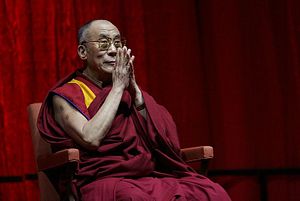His Holiness Dalai Lama’s upcoming visit to Tawang, in the Indian state of Arunachal Pradesh, on April 4 has created great consternation in China. In a veiled threat, the Chinese foreign ministry has warned India not to facilitate the Tibetan spiritual leader’s visit to Tawang, saying the visit may severely impact India-China relations.
Ever since the Dalai Lama, and his tens of thousands of disciples, escaped Chinese oppression by fleeing to India in 1959, China has been closely monitoring his movements in India and abroad. China views him as a “splittist” (or separatist) who has consistently refused to accept Chinese control over Tibet. In reality, the Dalai Lama has accepted Tibet is a part of China, but has only demanded autonomy for Tibet, a predominately Buddhist region with a distinct language, ethnic group, and culture. The Dalai Lama, who had initially fought for a “Free Tibet,” realized that his demand was impractical, as it would be virtually impossible to take on the might of China. He accepted Tibet’s status as a subregion of China, but stuck to his call for autonomy under Chinese sovereignty. To date China has been unwilling to accept this demand.
The Dalai Lama’s visit to Tawang has not been taken kindly by China, as they consider Tawang to be part of southern Tibet, and, therefore, a part of China. India, on the other hand, has repudiated their claim, citing a treaty signed by the British and Tibetan representatives, popularly called the “Simla treaty,” under which Arunachal Pradesh was declared to be part of India. China had rejected the treaty on the grounds that the then-Tibetan government was not representing a sovereign country and had illegally entered into an agreement with the British. Arunachal Pradesh became one of the main focal points that led to the Sino-Indian war in 1962, where the Chinese entered 45 kilometers inside Arunachal Pradesh but vacated to avoid international pressure. However, they did manage to occupy over 30,000 square kilometers in the Aksai Chin area, which they have refused to vacate. Aksai Chin and Arunachal Pradesh continue to be a major thorn in Sino-India relations. In spite of holding 16 rounds of border talks, no agreement is in sight.
The Chinese foreign ministry has now sent out feelers to India indicating that, if New Delhi agrees to concede only Tawang (and not their earlier claim of the whole of Arunachal Pradesh), Beijing can consider handing back over 30,000 sq km of land in Aksai Chin. On the other hand, there are now indications in the Indian establishment that if China is willing to forgo its claim on Tawang as well, India may be willing to concede Aksai Chin to China.
Interestingly, the Chinese leader Deng Xiaoping had once proposed a similar agreement, saying China was ready to forgo its claim over Arunachal Pradesh if India agreed to accept Aksai Chin to be part of China. India at the time outright rejected the offer. The Chinese government criticized India for not being open-minded about finding a mutually acceptable solution to resolve the dispute.
Lately, China has been flexing its geopolitical muscle, not only with India. Recently, Beijing came down heavily on Mongolia for allowing the Dalai Lama to visit. Fearing economic sanctions, Mongolia was pressured to kowtow to the Chinese and agree not to allow the spiritual leader to visit their country in the future — despite the fact that many Mongolians also consider the Dalai Lama to be their spiritual leader. In fact, the word “Dalai” is Mongolian for ocean, meaning Dalai Lama can be roughly translated as “ocean of wisdom.”
In fact, China has been monitoring all of the Dalai Lama’s visits abroad and has been consistently putting pressure on foreign capitals not to allow him to visit their countries. There is a growing feeling in China that Western countries are using the Dalai Lama as a pawn to embarrass China. The Dalai Lama has become a revered figure not only among Buddhists but people following all religions. His lectures and teachings on compassion and peaceful and thoughtful approaches to life and conflict has endeared to him to the world community. He was awarded the Nobel Peace Prize in 1989 for his efforts to peacefully reconstitute a unified Tibet, despite protests from China.
April 4 will not be the Dalai Lama’s first visit to Tawang. In November 2009, he was allowed by the Indian government to visit Arunachal Pradesh. The Chinese had also protested then, but this time the protest appears to more strident. One of the reasons for China’s discomfort is that the Dalai Lama, because of his advancing age, may anoint his successor from Tawang. China wants to control future reincarnations of the Dalai Lama and thus have tighter control over Tibetans. If the Dalai Lama’s reincarnation is found in a traditionally Tibetan area that lies outside China’s control, they fear another generation of Tibetan opposition to Chinese rule. In spite of the annexation of Tibet, the Tibetans still continue to revere the Dalai Lama and look for his spiritual guidance. Over 200 Tibetans have immolated themselves during the last few years, protesting against Chinese restrictions on their culture. China, as part of a deliberate strategy, has relocated tens and thousands of Han Chinese in Tibet to check any attempt by the locals against any possible uprising.
The present leadership in India will not buckle under China’s pressure, as it is unhappy with China’s role in blocking its membership in the Nuclear Suppliers Group and also for putting a technical hold on India’s bid to designate the Pakistan-based chief of Jaish-e-Muhamamd (JeM) as a terrorist. It is for this reason India has decided to take a calculated risk by facilitating the Dalai Lama’s visit to Tawang.
K. S. Venkatachalam is an independent Columnist and Political commentator.
































